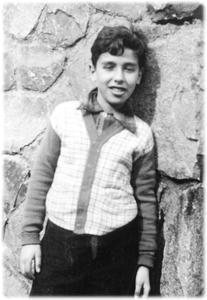

Writer, novelist
(1935– )
The other day, I was watching some children play on the Upper East Side. There were organized groups, some playing Wiffle ball and some softball. Then there was another group I observed on Randalls Island. Parents sign their children up to play, and they pay to have referees, depending on the sport. In one case it was soccer, and in another it was flag football. It’s all organized play. That was so far from my experience growing up in the Bronx that it’s as if we were in two different solar systems.
The world that I grew up in, in terms of sports, was between 183rd Street and 184th Street on Creston Avenue and Field Place, the actual street where I lived. Those streets were just west of the Grand Concourse. If you went just a few inches south of 183rd Street there was a different group of kids. You didn’t play there. The two blocks I played in were my entire world until the time I moved from that neighborhood, which would’ve been in the midfifties. I don’t know whether the demographics have changed in terms of the numbers of children in the neighborhood. I’ve been back there many, many times. I went back for a novel I wrote. I went back to do articles over the years. I went back with other people who were asking me about my memories. Each time I saw hardly any children in the streets. Now maybe it’s what memory does, but I have a feeling that the actual culture of just releasing your children to play outside has changed as well.
Our streets backed up to the school yard of the then Bronx High School of Science where there was a basketball court or at least a backboard and a rim. The neighborhood kids co-opted it. The school yard also had a wall, which became a place to play handball. There was a small area that became a place where we played punchball. And there was a little section where we played pitching-in stickball. There was also a side wall where we could play boxball. Playing ball was what we did as often as we could.
There was a famous basketball player called Bob Cousy. He was legendary. He played for Holy Cross College and then he was a major player for the Boston Celtics. And among the older guys in our neighborhood was Bob Santini. He played for Iona College so he was pretty good. Creston Junior High School was a destination school yard for good ballplayers and Bob Santini, who took a liking to me, would play there. I was small and he was tall, and he called me “Cousy.” Well that was the greatest thing I was ever called in my life. There was nothing more thrilling for me than to play in a game and to be called “Cousy.” We’d be making up sides and he’d say, “I got Couse.” There’d be three-man basketball games, and he’d say, “Nice pass, Couse.” It was around then that I realized I could actually play well enough to play. And that was thrilling.
Stickball was the most popular and most majestic of the street games. On our street it cut across ages because it was such an enthralling game to play. The older guys could play, and some adults even played with us. Younger kids too. To be honest, it was a game of great elegance played on a very rudimentary skill level because it was hard to strike out. The bases were marked with chalk, if we had chalk. If not, the DeSoto car was first base, the Buick on the other side of the street was third base, and the sewer was second base.
We had a ritual that was repeated by all. You’d steal a broomstick or a mop stick from your home and then work it on a manhole cover until you could cut the end off. And if it was a good stick, maybe that was your stick. Just the way baseball players have their favorite bats. That was your stick. And it was played with a Spaldeen. It wasn’t tolerated easily by the police and building superintendents because you could break windows with the ball. If the police came by and they caught you, they would confiscate your stick and therefore break up the game. You wouldn’t be arrested, but there was always friction between the kids and the cops. The squad car would drive down Creston Avenue and if somebody spotted it they’d alert the hitter and hide the stick, usually under a parked car. “Chicky—chicky, the cops!” Then we’d pretend to be playing punchball, which was completely implausible, because stickball players could be a city block away and there’s no way we could punch a ball that far.
And then the street games ended. They didn’t end in the school yards, and they didn’t end on the sidewalks, but we never played in the street again. The Second World War ended, and with that it was as though someone turned a light out on us. During the war there had been gas rationing and there wasn’t a lot of money around. It wasn’t what you’d call a car-owning neighborhood. There’d be no real reason to have one. But then when the war ended and gas rationing ended, we were literally driven out of the streets by the automobiles. Once in a while you might get a stickball game together, but it was impossible because there was so much traffic coming through. My friend Ben Miller had a father who drove down Creston Avenue in a Buick the size of a house, it seemed. And with that Buick it was over. It wasn’t Ben Miller’s father who ended it, but we just couldn’t be in the streets anymore. My street-game universe ended. At the end of World War Two, my ball-playing-street-game life ended.